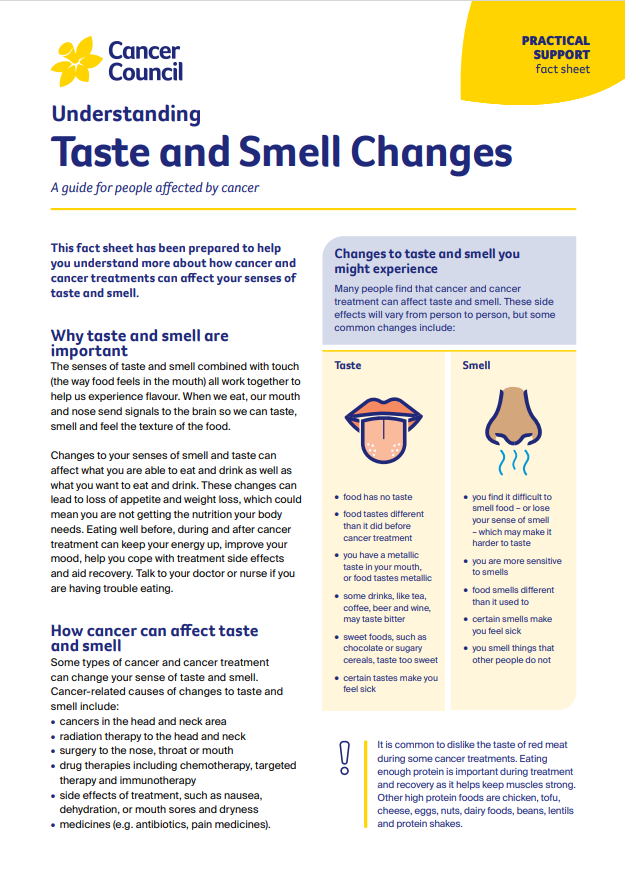- Home
- About Cancer
- Managing side effects
- Taste and smell changes
- What changes could I experience?
What changes could I experience?
Many people find that cancer and cancer treatment can affect taste and smell. These side effects will vary from person to person, but some common changes include:
 Taste
Taste
- food has no taste
- food tastes different than it did before cancer treatment
- you have a metallic taste in your mouth, or food tastes metallic
- some drinks, like tea, coffee, beer and wine, may taste bitter
- sweet foods, such as chocolate or sugary cereals, taste too sweet
- certain tastes make you feel sick
 Smell
Smell
- you find it difficult to smell food – or lose your sense of smell – which may make it harder to taste
- you are more sensitive to smells
- food smells different than it used to
- certain smells make you feel sick
- you smell things that other people do not
It is common to dislike the taste of red meat during some cancer treatments. Eating enough protein is important during treatment and recovery as it helps keep muscles strong. Other high protein foods are chicken, tofu, cheese, eggs, nuts, dairy foods, beans, lentils and protein shakes.
How long do changes last?
Most changes will get better with time, but it can depend on what type of treatment you have and where the cancer is in your body. Your doctor will be able to tell you how long your sense of smell and taste are likely to be affected. You may also be advised to try different flavours to help your sense of taste to recover.
If you have chemotherapy, you might notice that symptoms can vary during a single treatment cycle. People who have chemotherapy without other treatments will often find that taste and smell problems improve about 2–3 months after treatment has ended, and most people recover completely within 6 months.
People who have radiation therapy to the head or neck area may find their senses of taste and smell recover a couple of months after treatment ends. Some people have longer-term or even permanent changes to taste and smell, especially if they experience ongoing issues with dry mouth.
→ READ MORE: The impact of treatments on taste and smell
Podcast: Appetite Loss and Nausea
Listen to more episodes from our podcast for people affected by cancer
Video: Nutrition and cancer
More resources
Isabel Bailey, Dietitian, Peter MacCallum Cancer Centre, VIC; Chris O’Brien Lifehouse Dietetics Team, NSW; Lyn Leaver, Consumer; Paula Macleod, Head, Neck and Thyroid Cancer Nurse Coordinator, Royal North Shore Hospital, NSW; Rosemary Martin, Clinical Nurse Consultant, Oncology, Broken Hill Base Hospital, NSW; Catherine Meredith, Consumer; Louise Moodie, Director Dietetics, Mackay Hospital and Health Service, QLD; Chris Rivett, 13 11 20 Consultant, Cancer Council SA; Dr Jess Smith, Medical Oncologist, GenesisCare Campbelltown, NSW.
View the Cancer Council NSW editorial policy.
View all publications or call 13 11 20 for free printed copies.

